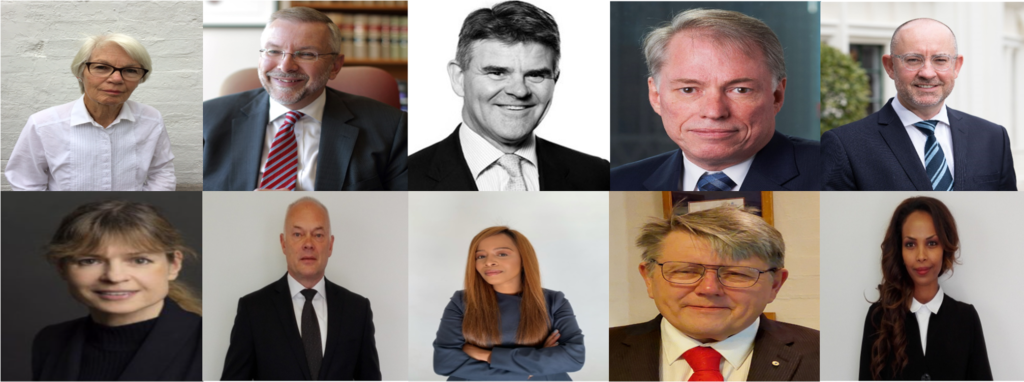
Working Group Members:-
- Her Honour Frances Kirkham CBE, England;
- The Hon Justice Brian Preston FRSN SC – Chief Judge of the Land and Environment Court of NSW, Australia;
- Dr Richard Manly QC, Australia;
- Mr Phillip Greenham, Enterprise Fellow BSc LLB AAIPM, FAMINZ (Arb), FACICA, FCIArb, Australia;
- Mr Mark Colthart LLM (Hons) FCIArb, New Zealand;
- Ms Stephanie Barwise QC, England;
- Prof Kim Lovegrove MSE, RML, New Zealand and Australia;
- Ms Zama Ngcobo, South Africa;
- Prof Robert Whittaker AM, FRSN, FAIB, FAIQS, MAIBS, Australia; and
- Coalition Secretary: Mrs Tsigereda Lovegrove, Australia and Ethiopia.
One of the most important new coalitions established by the IBQC for 2022 is the good practice dispute resolution guidelines group. The group will develop good practice and sustainable guidelines for a range of applications in the dispute resolution domain.
The dispute resolution guidelines’ key objective will be exploring how to best develop the design of, and enhance, dispute resolution systems. A key aim is to provide access to justice by making building dispute resolution more cost effective and efficient. The delivery of just outcomes is another fundamental objective central to the IBQC’s mission, and will be central to this working group.
In the building and construction sector, the above are outcomes that are best delivered by institutions that have bespoke built ecology expertise. It is recognised that there are significant jurisprudential differences amongst the various countries and cultures across the globe. These differences are often shaped by history and culture. Notwithstanding, there are certain universals that underscore that which characterises best practice dispute resolution for the building sector and this working group will be preoccupied with that mission in the generation of guidelines that will have a particular application to the building setting.
Cost-effectiveness and access for justice are particularly important as there are some countries where access to dispute resolution theatres has evolved to a state where access is beyond the reach of many citizens. Further, in some emerging economies, key institutions may lack sufficient funding to deliver best practice dispute resolution outcomes. The IBQC is very live to this and the innovations that will be incorporated into the guidelines including (amongst many others) the likes of advances in appropriate dispute resolution (otherwise known as alternative dispute resolution) and the reduction of adversarial expert evidence are the sorts of areas that will be explored and honed in the good practice guidelines.
Very careful consideration has been given to the composition of the IBQC working group. National or international pre-eminence was a key consideration both in respect of construction law advocates, law reformers and senior jurists. Further, the IBQC has sought representatives from both hemispheres to collaborate on these guidelines.
The working group members are featured in the photo collage and comprise jurists, experienced high level law reformers and leading advocates from the United Kingdom, South Africa, Australia, New Zealand and Ethiopia so there is diversity in terms of regional representation. Some of the members have been heavily involved in the development of best practice dispute resolution law reform recommendations in Australia, New Zealand, Africa and Japan. This experience will be drawn up along with the high-level expertise of senior members of the judiciary and advocacy fraternity.
Project 1 – Dispute Resolution Theatre Process Enhancement and Improvement Guidelines
These guidelines will focus on how best to improve dispute resolution processes and systems to deliver faster and more cost-effective dispute resolution processes. Regard will be had to developing guidelines for (amongst other things): –
- Front-end mediation
- Dedicated construction lists
- Enhanced independent expert witness systems to minimise expert adversarialism
Project 2 – Climate Change and Sustainability Building Regulatory Guidelines Group
The guidelines will involve the development of ‘touch point’ overarching principles (a ‘menu’ list, as it were, of key guidance pointers) that law reformers can have regard to when they develop building regulations that serve to ameliorate and minimise the impact of climate change.
Project 3 – International good practice guidelines designed to enhance arbitration proceedings
These guidelines will encapsulate the essence of that which makes for good practice arbitration. It is recognised that there will be no of reinventing of the wheel in light of the tremendous array of erudite publications on offer. These will be considered with the view to synthesising best practice on point.
Download